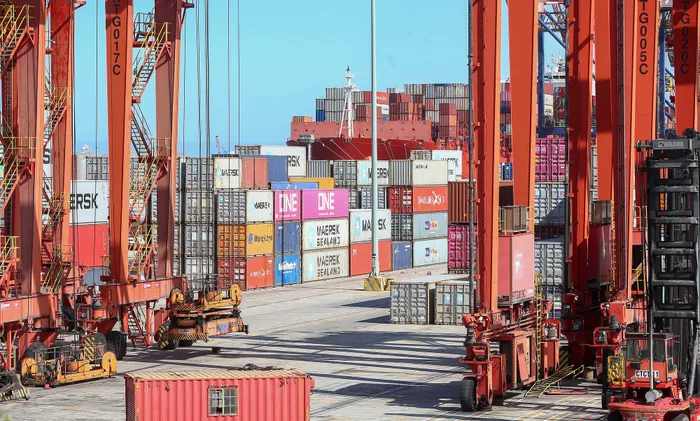Time is wealth: reclaiming the hours lost to congestion, collapse and inequality
LOGISTICS

Every day, millions of South Africans lose hours to inefficiency.
Image: Leon Lestrade/ Independent Newspapers
South Africa’s most undervalued resource is not land or minerals; it is time.
Every day, millions of South Africans lose hours to inefficiency.
Businesses bleed 140 million hours annually due to logistics delays, costing the economy R248 billion.
Individual commuters forfeit an average of 144 hours a year stuck in traffic. Six million tons of coal are pushed onto roads due to rail collapse, worsening gridlock and damaging infrastructure.
Women, in particular, carry a disproportionate burden, spending 30 percent more time travelling than men, often in unsafe, unreliable systems that restrict their access to work and education.
In rural areas alone, residents lose up to 20 hours each week simply trying to access essential services.
These are not isolated inconveniences.
They are structural inefficiencies with systemic costs.
The cumulative national loss is staggering. Yet, within this crisis lies the opportunity to build an economy that runs on time rather than with delays.
South Africa urgently requires a coordinated national strategy to address time poverty, anchored in transport reform, port revitalisation, digital public services and inclusive mobility.
This is not simply about efficiency; it is a matter of equity, dignity and competitiveness. Stats SA’s 2022 Time Use Survey confirms that women in South Africa spend an average of 4.5 hours a day on unpaid travel, compared to 3.5 hours for men—a 30 percent time penalty that compounds daily.
Over a year, this is equivalent to 28 full working days lost simply due to inefficient, unsafe and unequal transport access.
This stolen time limits women’s access to employment, education and entrepreneurship.
In South Africa’s startup ecosystem alone, transport barriers have been shown to reduce productivity in women-led businesses by up to 10 percent.
This burden is compounded in low-income and rural households, where inadequate public services, childcare responsibilities and long distances between essential points of access trap women in a daily cycle of unproductive mobility. Beyond gender, time poverty cuts across all segments.
Due to port inefficiencies, businesses lose 120 million hours annually in logistics delays and an additional 20 million. Commuters lose 144 hours in congestion and public service queues cost the population 50 million hours annually.
A core contributor to this loss is the collapse of South Africa’s freight rail network.
With freight volumes down Inequality 24 percent, coal and minerals are being rerouted onto roads, adding an estimated 400 trucks per day to already congested highways.
Durban’s port delays alone result in R150 billion in lost exports annually, while portside communities like Wentworth lose up to 10 hours per week to traffic-related gridlock.
In response, some private sector leaders have stepped up their interventions where the public sector has fallen short.
Anglo American’s R10 billion investment in revitalising freight corridors marks a significant intervention which is expected to shift millions of tons of coal off the roads and save over 10 million hours annually.
Transnet’s integration of AI-based freight tracking has led to a 15 percent reduction in shipment delays. Globally, Singapore’s Tuas Port offers a powerful benchmark.
Its automated systems and AI-driven scheduling have reduced processing time by 40 percent, recovering over 15 million hours yearly.
This is the model South Africa must adopt if it intends to remain competitive under the African Continental Free Trade Area. However, digitisation must extend beyond ports and rail to everyday life. An estimated 50 million hours are lost annually in queues at clinics, government offices and payment centres.
With only 41 percent internet penetration, many communities are still excluded from time-saving e-services.
Yet the success of platforms like WhereIsMyTransport, used by over 500,000 South Africans for real-time route information, demonstrates the potential. eThekwini’s digitised municipal services saved an estimated one million hours in 2024 alone.
Expanding broadband and localised transport tech can reduce wait times, cut transport costs and enhance productivity at scale.
Time reclamation must also be anchored in community solutions. In Khayelitsha, informal ride-sharing networks have reduced average commute times by 20 percent.
Cape Town’s 2024 pilot of women-only train carriages saw a 40 percent drop in harassment reports, reinforcing the need for gender-sensitive transport planning. Rural e-bike delivery hubs, based on successful models like Rwanda’s Zipline, could reduce last-mile travel times by up to 30 percent. Micro-innovations can contribute to a broader inclusion, safety and economic participation ecosystem.
While some argue that port automation and AI threaten jobs, international evidence increasingly suggests otherwise.
Smart ports create higher-value employment in engineering, digital maintenance and supply chain optimisation, provided that retraining and education investments are made in parallel.
This is not an either-or decision. It is an opportunity to build a dual economy where time and technology work in tandem to uplift rather than exclude.
Economically, the dividends are substantial. According to the Department of Higher Education and Training, reviving rail and port infrastructure could save the country R160 billion annually, with an additional R30 billion in GDP gains from time savings.
These infrastructure investments could generate 60,000 new jobs and support over 10,000 in portside communities.
Environmentally, coal-to-rail shifts are expected to reduce carbon emissions by at least 35,000 tons annually. With transport contributing 10.8 percent of South Africa’s total emissions, time reform is not just an economic or gender issue, it is a climate imperative.
Globally, South Africa ranks 101st out of 139 countries on the World Bank’s Logistics Performance Index, trailing regional peers like Kenya and Ethiopia.
This inefficiency costs more than money; it costs time, credibility and investment.
Under AfCFTA, time efficiency is not optional. If South Africa reduced border and port delays by just 30 percent, it could unlock a 20 percent increase in exports, according to the United Nations Economic Commission for Africa.
Failure to act carries broader strategic risks. Global exporters are already diverting supply chains to more efficient East African ports.
If South Africa does not modernise its time infrastructure, it risks being bypassed in the very continental trade bloc it helped to shape.
Time poverty, if left unchallenged, becomes a risk to national stability, not just a drag on GDP.
Solving South Africa’s time crisis also accelerates progress on the UN’s Sustainable Development Goals, especially SDG 5 (Gender Equality) and SDG 9 (Industry, Innovation and Infrastructure), where transport, access and inclusion converge.
Time is not infinite. It is not neutral.
And in South Africa, it is not equally distributed.
We must start by reclaiming the hours stolen by dysfunction, delay and neglect to rebuild this nation.
Time, like freedom, should not be a privilege. It is the currency of dignity and South Africa must fight to restore it.
Nomvula Zeldah Mabuza is a Risk Governance and Compliance Specialist with extensive experience in strategic risk and industrial operations. She holds a Diploma in Business Management (Accounting) from Brunel University, UK, and is an MBA candidate at Henley Business School, South Africa.

Nomvula Zeldah Mabuza is a Risk Governance and Compliance Specialist with extensive experience in strategic risk and industrial operations. She holds a Diploma in Business Management (Accounting) from Brunel University, UK, and is an MBA candidate at Henley Business School, South Africa.
Image: Supplied
BUSINESS REPORT
Visit: www.businessreport.co.za